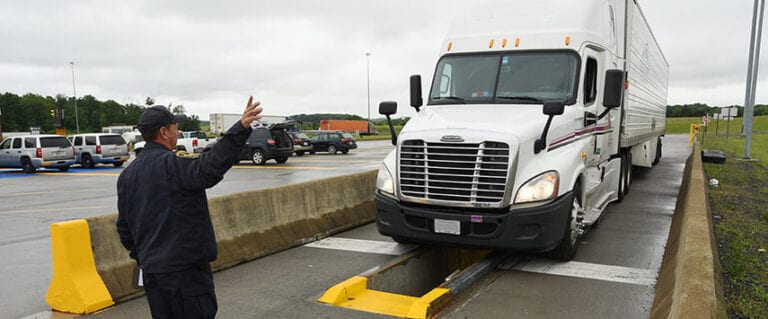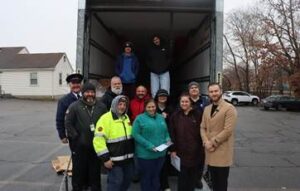WASHINGTON — The Commercial Vehicle Safety Alliance (CVSA) has announced May 16-18 as this year’s International Roadcheck.
International Roadcheck is a high-visibility, high-volume 72-hour inspection and enforcement event where CVSA-certified inspectors in Canada, Mexico and the U.S. will conduct inspections of commercial motor vehicles and drivers at weigh/inspection stations, designated inspection areas and along roadways.
This year, inspectors will focus on anti-lock braking systems (ABS) and cargo securement to highlight the importance of those aspects of vehicle safety, according to a news release.
The CVSA notes that although ABS violations are not out-of-service violations, “ABS play a critical role in reducing the risk of collisions by preventing the wheels from locking up or skidding, allowing a driver to maintain control of the vehicle while braking. In addition, improper cargo securement poses a serious risk to drivers and other motorists by adversely affecting the vehicle’s maneuverability, or worse, causing unsecured loads to fall, resulting in traffic hazards and vehicle collisions.”
During International Roadcheck, inspectors will conduct their usual roadside safety inspections of commercial motor vehicles and drivers. Data will be gathered from those three days and shared later this year, as a snapshot of the state of commercial motor vehicle and driver safety.
International Roadcheck also provides an opportunity to educate the motor carrier industry and general public about the importance of safe commercial motor vehicle operations and the North American Standard Inspection Program.
During a routine North American Standard Level I Inspection, inspectors focus on two areas – driver and vehicle safety compliance.
- Vehicle safety — Inspectors will ensure the vehicle’s brake systems, cargo securement, coupling devices, driveline/driveshaft components, driver’s seat, fuel and exhaust systems, frames, lighting devices, steering mechanisms, suspensions, tires, wheels, rims, hubs and windshield wipers are compliant with regulations. Inspections of motorcoaches, passenger vans and other passenger-carrying vehicles also include emergency exits, seating, and electrical cables and systems in the engine and battery compartments.
- Driver safety — Inspectors will check the driver’s operating credentials, hours-of-service documentation, status in the drug and alcohol clearinghouse, seat belt usage, and for alcohol and/or drug impairment.
Vehicles that successfully pass a Level I or Level V Inspection without any critical vehicle inspection item violations may receive a CVSA decal, which is valid for three months. If the inspector does identify critical vehicle inspection item violations, as outlined in the North American Standard Out-of-Service Criteria, the vehicle will be restricted from operating until the identified out-of-service conditions have been corrected. Inspectors may also restrict the driver from operating if the driver is found to have driver out-of-service violations, such as not possessing a valid or necessary operating license or exhibiting signs of impairment.
The Trucker News Staff produces engaging content for not only TheTrucker.com, but also The Trucker Newspaper, which has been serving the trucking industry for more than 30 years. With a focus on drivers, the Trucker News Staff aims to provide relevant, objective content pertaining to the trucking segment of the transportation industry. The Trucker News Staff is based in Little Rock, Arkansas.
















I think that safety is everyone’s first priority but, in my opinion, cvsa should also look at people that drive cars. every time there is a car versus big truck, the truck driver is always at fault especially when the car is at fault. That’s just not right.
This Always happens, no surprise. A Part of the trucking business.
The Lord is Great!